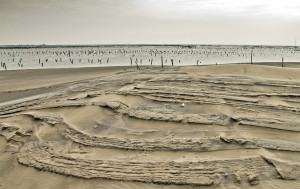What if we remade the climate?
Torrential autumns, worrying droughts: is this our future? An update on the weather we can expect at the Paris Climate Conference (COP21). The summer that just ended? Dry, hot, sunny. A blessing for tourists. But a source of growing concern for climate scientists.
Eric Servat does not hide his concerns about the state of the climate and how it is changing. A hydrologist, he is director of the Research Environment Research Observatory (Oreme), whose main objective is to understand Mediterranean environments and study natural risks.
Climate change is here
"Until now, IPCC* reports—which are authoritative on the subject—have remained very cautious about the impact of climate change. That's over! Today, everyone knows that we're there. Climate change is no longer a thing of the future. It's here, right before our eyes," reveals Eric Servat.
Will climate change have a tangible impact on our lives? For Eric Servat, it already has. The hydrologist draws a direct link between increasingly hot summers and the famous "Cevenol episodes," the torrential rains that regularly disrupt the Languedoc-Roussillon region. "The Mediterranean Sea is a factor of instability, " he explains. " This virtually closed environment behaves like a pressure cooker when heated, generating severe meteorological instability in the region."
Major trends
Last fall, there were no fewer than nine significant weather events in Languedoc-Roussillon. This fall of 2015 is no exception, with extreme rainfall in Montpellier on August 23 that claimed two lives, and floods that devastated the town of Lodève on September 14. These episodes occurred rather early in the season, which climatologists believe is yet another sign of climate change.
Responsible? Global warming: the cause is clear. Although there are no official figures, everything seems to indicate that the period we have been experiencing for the past three decades is very unusual: "undoubtedly the warmest the northern hemisphere has seen in nearly 1,400 years,"says Eric Servat. "Since the beginning ofthe 20th century, the average sea level has risen by 19 cm. This trend has most likely been accelerating since the 1950s."
This trend is unlikely to reverse any time soon, as the global climate system is extremely slow to change. Climate scientists use the following analogy to describe this phenomenon: if you turn off the engine of a ship traveling at full speed, it will continue to move forward for a very long time. This is an idea that public authorities have taken on board, since the measures being considered today are not aimed at reversing the trend, but at limiting it to a 2°C rise in temperature by the end of the century.
Interview with David Mouillot (Marbec)
Interview with Olivier Maury (Marbec)
Floods and droughts
Public authorities must be aware of the scale of the risks, according to the director of Oreme. "In the Mediterranean, this will result in a decrease in annual rainfall of between 5 and 30%." This is a real disaster for many regions in the Middle East and on the southern shore of the Mediterranean, which are already below the critical threshold of "water stress": less than 1,000 m3 of water per year per capita.
"For these populations, this means increasing difficulties in accessing water, as well as problems for agricultural production and a significant impact on the environment,"concludes Eric Servat. The hydrologist points to two figures: "Floods already account for one-third of natural disasters and more than half of the deaths caused by these disasters."
2015, a landmark year for the climate
France will chair the United Nations Climate Change Conference in Paris in December 2015.
The challenge: to reach, for the first time, a universal and binding agreement that will enable us to combat climate change effectively and drive a genuine transition towards more sustainable and low-carbon societies.
* The Intergovernmental Panel on Climate Change (IPCC) was established in 1988 to assess climate change.
